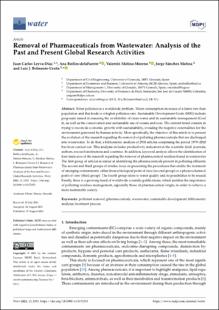Removal of pharmaceuticals from wastewater: Analysis of the past and present global research activities
...
Leyva Díaz, Juan Carlos | 2021-08-27
Water pollution is a worldwide problem. Water consumption increases at a faster rate than population and this leads to a higher pollution rate. Sustainable Development Goals (SDG) include proposals aimed at ensuring the availability of clean water and its sustainable management (Goal 6), as well as the conservation and sustainable use of oceans and seas. The current trend consists in trying to reconcile economic growth with sustainability, avoiding the negative externalities for the environment generated by human activity. More specifically, the objective of this article is to present the evolution of the research regarding the removal of polluting pharmaceuticals that are discharged into wastewater. To do that, a bibliometric analysis of 2938 articles comprising the period 1979–2020 has been carried out. This analysis includes productivity indicators in the scientific field: journals, authors, research institutions and countries. In addition, keyword analysis allows the identification of four main axes of the research regarding the removal of pharmaceutical residues found in wastewater. The first group of articles is aimed at identifying the pharmaceuticals present in polluting effluents. The second and third groups of articles focus on presenting the procedures that enable the treatment of emerging contaminants, either from a biological point of view (second group) or a physicochemical point of view (third group). The fourth group refers to water quality and its possibilities to be reused. Finally, there is a growing trend of worldwide scientific publications, which justifies the importance of polluting residues management, especially those of pharmaceutical origin, in order to achieve a more sustainable society
LEER










